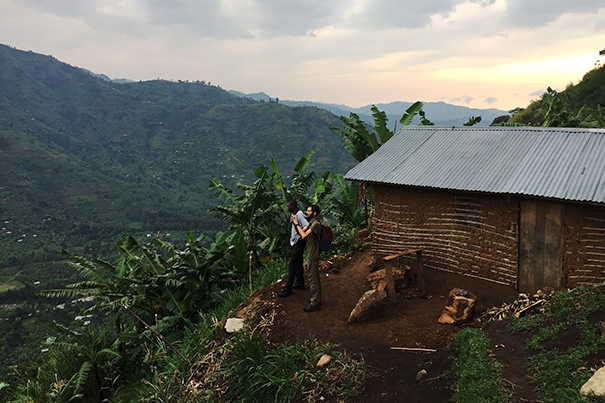Harvard student finds his place in rural Uganda
Global Health Institute volunteer shares his ‘uncomfortable icebreaker’
Each summer, the Harvard Global Health Institute (HGHI) Summer Research and Internships Program offers opportunities for Harvard undergraduates interested in global health to connect classroom knowledge and skills to complex issues in the field. These summer research opportunities and internships range from placements in laboratories and research groups to field work with hospitals and community health clinics to office-based internships with NGOs and international organizations. During the summer of 2017, HGHI funded 72 exceptional students to work with 53 different organizations in 20 cities and countries around the world.
Austin Valido, a senior concentrating in Human Development and Regenerative Biology with a secondary field in Global Health & Health Policy, spent his summer in Uganda with HGHI’s International Summer Undergraduate Research in Global Health (I-SURGH) program. Valido worked in both Bugoye and Mbarara with the MGH-MUST Collaborative, an international collaboration between Massachusetts General Hospital and Mbarara University of Science and Technology.
Once we were all arranged in a line, the cultural orientation facilitator read the rules of the activity. You start together as items are read from a list and, when an item applies to you, take one step forward. Simple enough. She began, “If you had access to running water as a child step forward.” There was nervous laughter as a handful of people shuffled forward. She continued, “If you had a cellphone before the age of 16 … If you had internet available at home … If you had access to a car growing up … If you had indoor plumbing … If you saw a pediatrician …” My face turned red as I found myself drifting farther and farther away from the majority. At the end of the activity, she invited us to look around. Starting off surrounded by my Ugandan colleagues, I, along with my co-intern and the handful of other foreigners present, ended up excruciatingly far in front.

We had just started the first half of our internship with the Global Health Collaborative and were preparing to participate in the community-placement program required for all medical, nursing, pharmacy, and biomedical laboratory students from the Mbarara University of Science and Technology (MUST). Being in a new culture and place, the last thing I wanted was something that would present me as even more foreign. It seemed like an exercise in embarrassment. The activity painfully presented, in a very clear, graphical way, what the vast majority of people there, including myself, already knew: We were coming from a place of unimaginable privilege, the richest university from the richest country in the world.
I’ve thought about my privilege before in the context of America — coming from a middle-class background with light skin and a loving mom, I’ve been fortunate in any setting — but I wasn’t fully cognizant of the shocking extent of my luck in the birth lottery until face-to-face with the poverty of rural Uganda. The statistics I memorized in class about child mortality, endemic disease, and lack of access to water and sanitation were — I realize this is a cliché but it’s true — no longer numbers but faces. I don’t mean to say this is the reality of the entirety of Uganda; the cities of Entebbe, Kampala, Fort Portal, and Mbarara buzz with business and development. I mean only that, due to decades of colonialism, corruption, and violence, there remain rural regions where unbelievable poverty persists.
However, any fear that the students would judge me as distant, pretentious, or affected because of my background proved unwarranted. We became a close-knit team in Bugoye, working together to interview the community and using our limited resources as students to educate and inform village members about health issues. They only cared that I was there to listen, learn, and work. It sounds sanctimonious, and fairly obvious, but I learned that the fact of my privilege was much less important than how I chose to confront and act upon it.

I concede to the incredible irony of this post: an anecdote where a position of incredible privilege, working internationally with a well-funded internship from Harvard, led to an experience where I could grapple with my privilege. I don’t write this to preach my changed psyche after visiting a foreign country, but to confront and interpret the emotions that still arise when I think about my incredible, undeserved fortune. The uncomfortable icebreaker at the beginning of the summer publicly called into question everything in my life I like to think involved some amount of self-determination. The reality: Everything I have accomplished in my life is hinged upon the people who support me, the country where I was born, and more than a fair share of luck. For further solidifying this awareness, I am grateful to the internship and the HGHI I-SURGH program.
I left my teammates amid rumors of an emerging oil industry and reports that the regional hospital was receiving fewer funds as already limited government resources were being diverted to create new oil infrastructure in the northwest. Doctors I spoke to were worried that an oil craze would cause the country to take one step forward and two steps back, filling the government’s coffers but driving inequality and corruption. I know that there are no easy solutions to problems of development and disparity, but, more so than anyone, I’m sure the young doctors, nurses, and scientists from MUST are up to the task. If so fortunate, maybe I could help out too.
To read additional blogs, visit the website.




